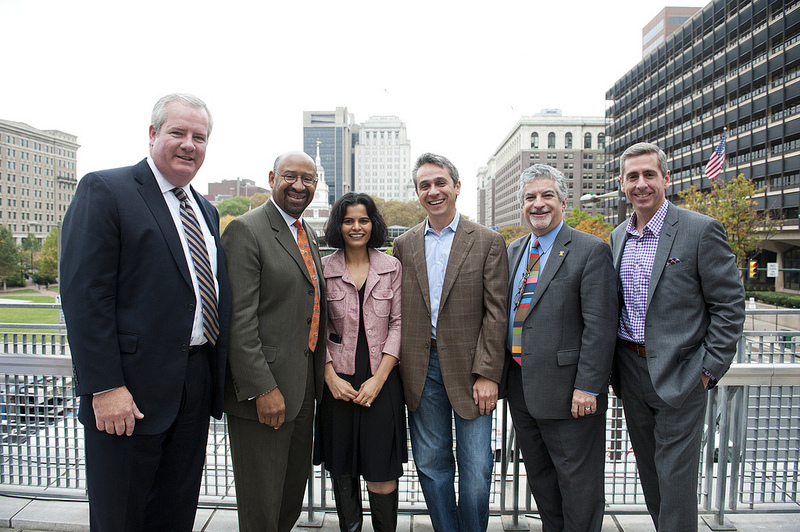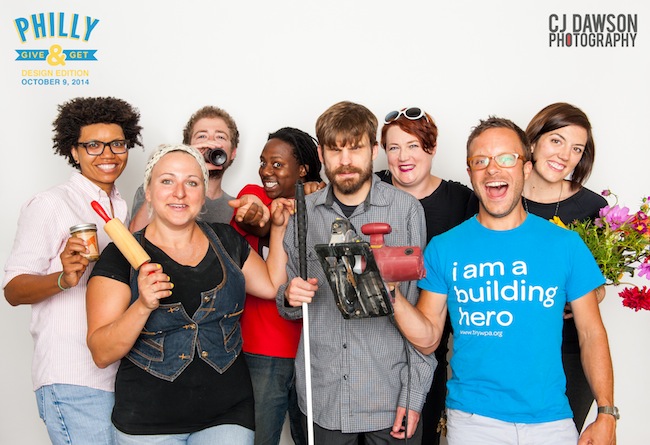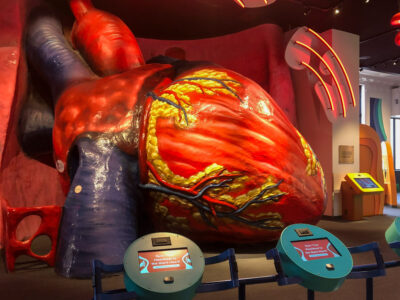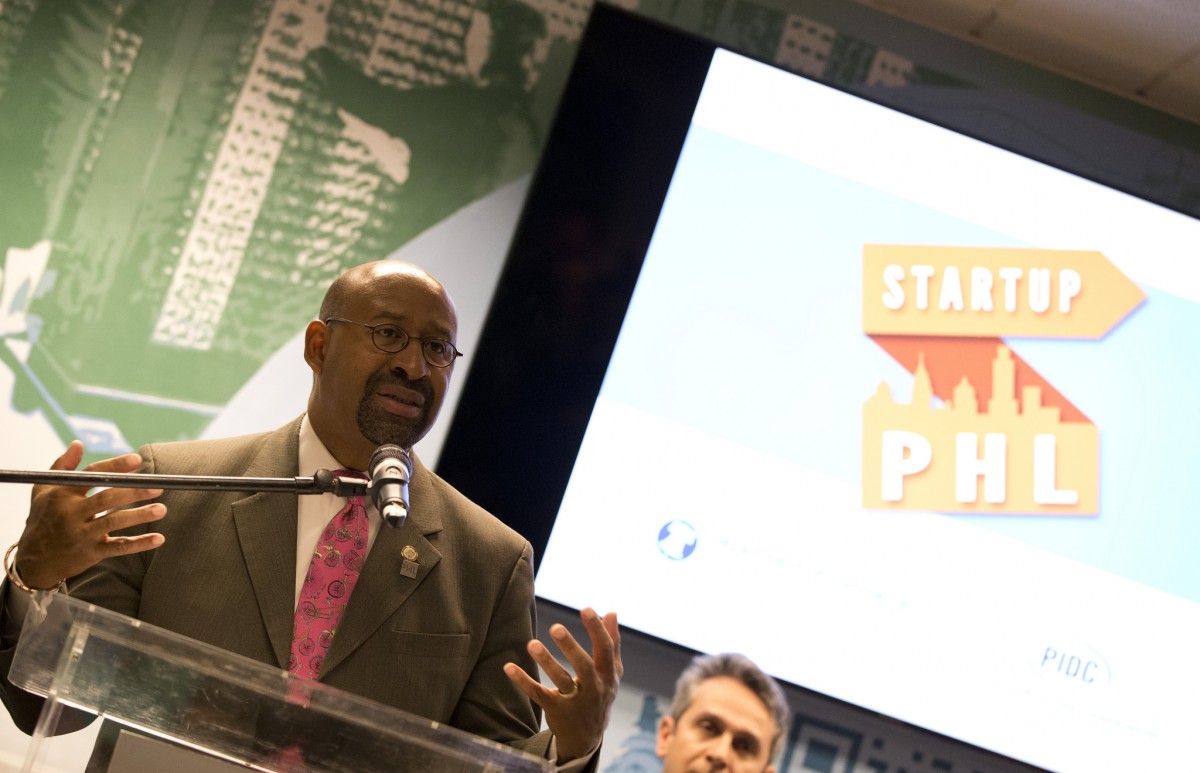Josh Kopelman was raising a glass to Philadelphia. It was filled with a kale smoothie. First Round Capital, Kopelman’s early-stage venture capital firm, and the City of Philadelphia had just announced the first investment from StartUp PHL, their partnered $6 million seed fund, a city initiative created to keep startups in Philadelphia proper.
They invested $200,000 in Real Food Works, a healthy meal subscription startup founded by a local tech veteran. That’s why, on a late October morning in a Chinatown art gallery-turned-startup office, Kopelman was sipping an organic shake with Mayor Michael Nutter and Lucinda Duncalfe, who made a career being part of the region’s suburban-ring, venture-backed, high-tech companies.
Now, she was moving her small team from a shared office in Conshohocken to a tiny street a short walk from City Hall. The event once would have seemed unlikely but today is symbol of where the energy in innovation clustering is developing now.
“It’s happening in the city,” Duncalfe said a few days later at an Economy League event. She moved her seven-person startup to the city last summer, in part due to the requirements for accepting the seed funding, but also because the serendipity of urban density is getting better at holding on to the knowledge workers and tech talent that Duncalfe wants to hire and work with.
Once devoid of high-tech startups, venture capital and young talent that actually wanted to stay in the city, Philadelphia is now blossoming almost all three (the venture capital is a toss-up, though the city’s legions of bootstrappers will tell you that’s not the only indicator of a flourishing tech scene). The suburbs, once powerful with the dot-com companies along the Route 202 Corridor, have quieted down. Those that still exist there have matured. Today, the city has taken the lead in energy, and it’s a trend seen across nation. But can Philadelphia’s momentum last?
The magnet of Philadelphia’s tech scene started in the suburbs

The Safeguard Scientifics campus in Wayne, Pa., was the major hub of tech business in Philadelphia in the 1990s.
Until recently, Philadelphia’s IT sector was exclusively scattered in its tax-lenient suburbs.
Out of the region’s 17 biggest technology business acquisitions since 2000, only one — Invite Media — was a Philadelphia-proper business (and, in that case, barely, as much of its leadership had vacated for New York). The rest were scattered in suburban business hubs like Conshohocken, Fort Washington and King of Prussia.
Before the 1990s-era Web 1.0 bubble burst, the Route 202 Corridor, stretching from West Chester to Fort Washington and sometimes dubbed “Great Valley,” boomed with tech activity. Montgomery and Chester counties employed 43,000 more people than Philadelphia in 2000, the Philadelphia Inquirer reported then.
Wayne-based venture capital firm Safeguard Scientifics and its legendary founder Pete Musser was the center of that universe, with tech companies big and small like Internet Capital Group, SAP America and Kopelman’s Half.com as notable stars of the constellation.

Safeguard Scientifics’ legendary founder Pete Musser, at left, in the 1980s, at right, in 2011.
Meanwhile, no one was describing Philadelphia city as having an entrepreneurial community.
“It was a bit lonely,” said Chris Stanchak, who founded Center City ticketing startup Ticketleap in 2003.
In the early 2000s, the Wharton grad worked at King of Prussia’s GSI Commerce during the day and built his business by night. Back then, there was no network of entrepreneurs like Philly Startup Leaders, no accelerators like DreamIt Ventures, no business incubators or coworking spaces or active meetup groups.
Ticketleap is now located in one of the city’s tech hubs: 2401 Walnut Street, an eight-story building that houses no fewer than five tech companies, including one Conshohocken transplant (Poptent), and an eco-friendly coworking space (City CoHo).
Rick Nucci, who founded cloud computing company Boomi in 2000, said it didn’t even cross his mind to locate his company in Philadelphia. He settled on Conshohocken because there was a promise of a tech hub there, he said. Nucci eventually moved his company to Berwyn and sold it to Dell for an estimated $80 million in late 2010.
Today, the Wynnewood resident is the president of Philly Startup Leaders and has headquartered his next startup, still in stealth mode, in Old City.
A city community grows in a vacuum

In fall 2012, the StartUp PHL program was announced. Pictured left to right: John Grady, President of the Philadelphia Industrial Development Corporation; Mayor Michael A. Nutter; Khushboo Shah, CEO of Philadelphia startup Cirrimize; Josh Kopelman, First Round Capital; Alan Greenberger, Deputy Mayor for Economic Development; and Bob Moul, President of Philly Startup Leaders. (Photo by Kait Privitera for the City of Philadelphia)
After the dot-com bubble burst, there was a void. Safeguard founder Musser had gone from billionaire to broke. ICG, Verticalnet, CDNow, Infonautics and other 1990s successes fizzled or outright went bust.
“The short-term appreciation in the Web 1.0 boom wasn’t enduring,” said Kopelman in a 2013 interview with Technical.ly Philly. “The thing that set Philadelphia back was that those entrepreneurs didn’t try again. A lot of people sort of took their ball and went home.”
It was in that quiet that a new generation grew, this time, the energy started in the city. To be sure, the Philadelphia tech scene grew rather humbly and organically.
- In 2006, Indy Hall launched a coworking movement on what’s now known as “N3rd Street,” a corridor of tech businesses along North 3rd Street
- In 2007, Philly Startup Leaders launched
- In 2009, DreamIt Ventures launched, making Philadelphia a destination for early-stage high-tech startups across the country (we’ll also humbly add that Technical.ly Philly launched then, too, covering a quickly coalescing city-bound conversation)
- The University City Science Center began hosting weekly tech events and soon followed more like Philly Tech Meetup and Philly Tech Week, which, full disclosure, Technical.ly Philly organizes.
Those movements built a community of people, of entrepreneurs and technologists. Then the jobs started coming, aided by a Nutter administration that saw an economic development opportunity.
Suburban companies like architecture software firm Bentley Systems and mobile device management firm Fiberlink opened satellite offices in Center City in 2012 to lure talent and to ease the reverse commute on its city-dwelling employees. In fall 2012, First Round Capital left West Conshohocken for West Philly in an effort to carry the “Philadelphia Tech torch,” as Kopelman put it.
“In the 1990s, you had to drive all around the region to go to different tech events,” said Duncalfe, of Real Food Works, at an event last fall. “Now it’s easy. If you’re hosting a tech event, you have it in city.”
In Philly or beyond, people from throughout the region can attend, helping to better connect it all, she said.
More and more tech companies left the suburbs for Philadelphia in 2013, like reputation manager Brand.com and its 120 employees, video production network Poptent and its nearly 30 employees and digital agency Netplus and its 25 employees.
It wasn’t just tech companies, either: tech teams from suburban companies like Bayada Home Health Services and Traffic Safety Store were opening up shop in Old City because they wanted to be closer to the action. That, and it was hard to convince developers to travel to the suburbs.
“You could not pay people enough to get them out there,” said Nick Eubanks, vice president of West Chester-based retailer Traffic Safety Store.
The Nutter administration says they had technology on their mind since the beginning.
When Bentley Systems announced the opening of its Center City satellite office in 2012, Nutter said his Commerce Department had been working toward that move since 2008, the year he entered office.
Since then, Nutter has championed tech companies of all stripes, from the early stage startups like 20-person visual analytics firm Curalate to the 3,000 employee-strong Bentley. He attends ribbon cuttings, his office sends out press releases when a new tech business chooses Philadelphia and he even launched the city’s first fund to invest in startups, as well as a grant program to support the tech sector.
Can the city’s momentum last?

The Philly Give and Get charity auction from organizers Kara Lafluer, Lansie Sylvia and Nick Eubanks, are an example of a social good effort that has come out of the city’s young tech community.
Philadelphia’s brain drain seems to have largely reversed: a 2010 Campus Philly report said that nearly half of non-native Philadelphia college students that the organization surveyed said they would stay in the region. But for how long?
A recent Pew Charitable Trusts study reported that half of the 20- to 34-year-olds it questioned said they definitely or probably would not be living in Philadelphia five to 10 years from now. They chalked it up to career choices, education for their (future) children and crime.
The tech scene has seen this play out, most recently with Tim Quirino, a designer who had been working at South Philly web development firm P’unk Ave. He left in January for a job with Facebook. He’ll be back, he said, if the tech scene grows to offer more jobs for designers and if the city’s public school system can turn around.
“If it can support the future generation well then that will definitely be a reason for me to come back to the city I love,” Quirino said.
Others, evoking the Pew study, call the city upswing a fad.
“This is fashionable, not inevitable,” said Paul Martino, an entrepreneur, investor and lifelong resident of the Philadelphia suburbs. “All the cool kids are in the city right now, but I won’t be surprised if the next tech bubble in 2022 is in the suburbs.”
Businesses also point to Philadelphia’s tax structure as another barrier to lasting progress in the city’s tech scene — though pre-profit startups might see that differently. Some in City Council are working on making city taxes less painful for business owners, but their success is still uncertain.
Despite these setbacks, a number of tech companies say they’re here to stay, and proud of it.
At the end of 2011, then-10-person Center City business analytics firm RJMetrics declared that it was “doubling down on Philadelphia.”
It was because of its rich talent pool, because the Philadelphia tech scene is thriving, because the city is a “lean startup’s paradise,” but also just because: “We love it here,” CEO Robert Moore said.
Two years later, Moore opened a bigger office and Mayor Nutter was on hand.
“Philadelphia is the best possible home for our startup,” he said.
Before you go...
Please consider supporting Technical.ly to keep our independent journalism strong. Unlike most business-focused media outlets, we don’t have a paywall. Instead, we count on your personal and organizational support.
3 ways to support our work:- Contribute to the Journalism Fund. Charitable giving ensures our information remains free and accessible for residents to discover workforce programs and entrepreneurship pathways. This includes philanthropic grants and individual tax-deductible donations from readers like you.
- Use our Preferred Partners. Our directory of vetted providers offers high-quality recommendations for services our readers need, and each referral supports our journalism.
- Use our services. If you need entrepreneurs and tech leaders to buy your services, are seeking technologists to hire or want more professionals to know about your ecosystem, Technical.ly has the biggest and most engaged audience in the mid-Atlantic. We help companies tell their stories and answer big questions to meet and serve our community.
Join our growing Slack community
Join 5,000 tech professionals and entrepreneurs in our community Slack today!

Look inside: Franklin Institute’s Giant Heart reopens with new immersive exhibits

What actually is the 'creator economy'? Here's why we should care
How Berkadia's innovation conference demonstrates its commitment to people and technology



